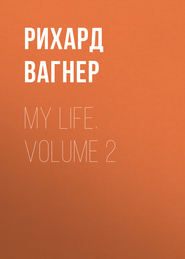По всем вопросам обращайтесь на: info@litportal.ru
(©) 2003-2025.
✖
Siegfried & The Twilight of the Gods. The Ring of the Niblung, part 2
Настройки чтения
Размер шрифта
Высота строк
Поля
Praising the skill
He does not possess?
When I take hold
Of what he has hammered,
The rubbish crumbles
At a mere touch!
Were not the wretch
Too mean for my wrath,
I would break him in bits
As well as his work—
The doting fool of a gnome!—
And end the annoyance at once!
[Siegfried throws himself on to a stone seat in a rage. Mime all the time has been cautiously keeping out of his way.
MIME
Again thou ravest like mad,
Ungrateful and perverse.
If what for him I forge
Is not perfect on the spot,
Too soon the boy forgets
The good things I have made!
Wilt never learn the lesson
Of gratitude, I wonder?
Thou shouldst be glad to obey him
Who always treated thee well.
[Siegfried turns his back on Mime in a bad temper, and sits with his face to the wall.
Thou dost not like to be told that!
[He stands perplexed, then goes to the hearth in the kitchen.
But thou wouldst fain be fed.
Wilt eat the meat I have roasted,
Or wouldst thou prefer the broth?
'Twas boiled solely for thee.
[He brings food to Siegfried, who, without turning round, knocks both bowl and meat out of his hand.
SIEGFRIED
Meat I roast for myself;
Sup thy filthy broth alone!
MIME [In a wailing voice, as if hurt.
This is the reward
Of all my love!
All my care
Is paid for with scorn.
When thou wert a babe
I was thy nurse,
Made the mite clothing
To keep him warm,
Brought thee thy food,
Gave thee to drink,
Kept thee as safe
As I keep my skin;
And when thou wert grown
I waited on thee,
And made a bed
For thy slumber soft.
I fashioned thee toys
And a sounding horn,
Grudging no pains,
Wert thou but pleased.
With counsel wise
I guided thee well,
With mellow wisdom
Training thy mind.
Sitting at home,
I toil and moil;
To heart's desire
Wander thy feet.
Through thee alone worried,
And working for thee,
I wear myself out,
A poor old dwarf!
[Sobbing.
And for my trouble
The sole reward is
By a hot-tempered boy
[Sobbing.
To be hated and plagued!
SIEGFRIED
[Has turned round again and has quietly watched Mime's face, while the latter, meeting the look, tries timidly to hide his own.
Thou hast taught me much, Mime,
And many things I have learned;
But what thou most gladly hadst taught me
A lesson too hard has proved—
How to endure thy sight.
He does not possess?
When I take hold
Of what he has hammered,
The rubbish crumbles
At a mere touch!
Were not the wretch
Too mean for my wrath,
I would break him in bits
As well as his work—
The doting fool of a gnome!—
And end the annoyance at once!
[Siegfried throws himself on to a stone seat in a rage. Mime all the time has been cautiously keeping out of his way.
MIME
Again thou ravest like mad,
Ungrateful and perverse.
If what for him I forge
Is not perfect on the spot,
Too soon the boy forgets
The good things I have made!
Wilt never learn the lesson
Of gratitude, I wonder?
Thou shouldst be glad to obey him
Who always treated thee well.
[Siegfried turns his back on Mime in a bad temper, and sits with his face to the wall.
Thou dost not like to be told that!
[He stands perplexed, then goes to the hearth in the kitchen.
But thou wouldst fain be fed.
Wilt eat the meat I have roasted,
Or wouldst thou prefer the broth?
'Twas boiled solely for thee.
[He brings food to Siegfried, who, without turning round, knocks both bowl and meat out of his hand.
SIEGFRIED
Meat I roast for myself;
Sup thy filthy broth alone!
MIME [In a wailing voice, as if hurt.
This is the reward
Of all my love!
All my care
Is paid for with scorn.
When thou wert a babe
I was thy nurse,
Made the mite clothing
To keep him warm,
Brought thee thy food,
Gave thee to drink,
Kept thee as safe
As I keep my skin;
And when thou wert grown
I waited on thee,
And made a bed
For thy slumber soft.
I fashioned thee toys
And a sounding horn,
Grudging no pains,
Wert thou but pleased.
With counsel wise
I guided thee well,
With mellow wisdom
Training thy mind.
Sitting at home,
I toil and moil;
To heart's desire
Wander thy feet.
Through thee alone worried,
And working for thee,
I wear myself out,
A poor old dwarf!
[Sobbing.
And for my trouble
The sole reward is
By a hot-tempered boy
[Sobbing.
To be hated and plagued!
SIEGFRIED
[Has turned round again and has quietly watched Mime's face, while the latter, meeting the look, tries timidly to hide his own.
Thou hast taught me much, Mime,
And many things I have learned;
But what thou most gladly hadst taught me
A lesson too hard has proved—
How to endure thy sight.











